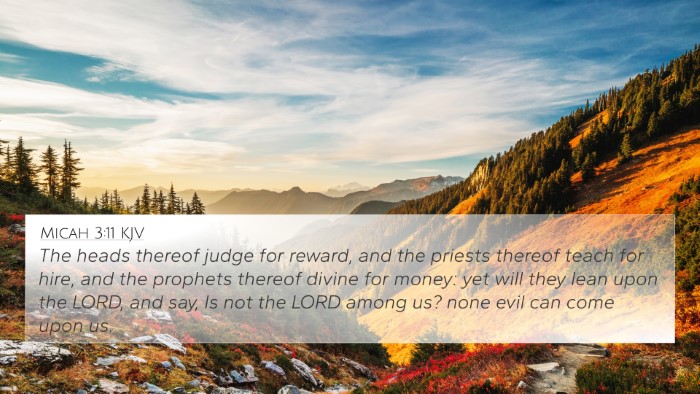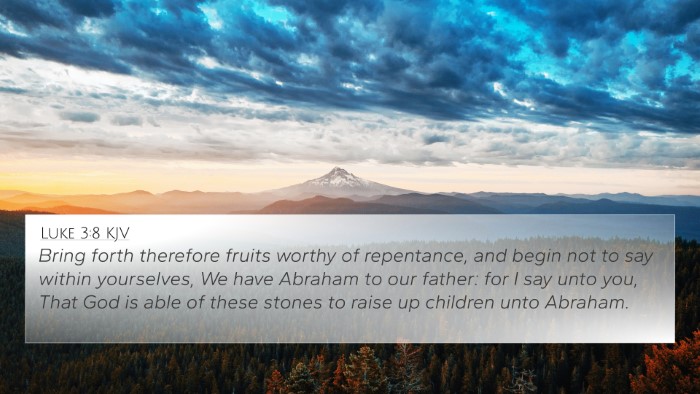Understanding Jeremiah 7:4
Jeremiah 7:4 states: “Do not trust in these deceptive words: ‘This is the temple of the Lord, the temple of the Lord, the temple of the Lord!’”
This verse serves as a powerful admonition against misplaced trust and false security in religious practices and traditions. The prophet Jeremiah, called by God, warns the people of Judah about the dangers of relying on the temple merely as a physical structure without genuine faith and righteousness.
Key Insights from Public Domain Commentaries
-
Matthew Henry:
Henry emphasizes that the people were placing their confidence in the temple's physical presence rather than in their relationship with God. He notes that this was a false assurance, as true worship requires internal holiness. The temple, while significant, does not exempt them from accountability to God's commandments.
-
Albert Barnes:
Barnes elucidates that the repetition of the phrase "the temple of the Lord" signifies a ritualistic reliance on the temple as a symbol of safety. He correlates this behavior to contemporary practices where individuals may rely on the outward forms of religion, neglecting the requisite moral and spiritual integrity.
-
Adam Clarke:
Clarke elaborates on the idea that trust in ritualistic elements and symbols can lead to complacency in pursuing a genuine relationship with God. He argues that the temple was not a safeguard against divine judgment, which Jeremiah warns against. This verse highlights the necessity of sincerity in faith rather than mere adherence to tradition.
Bible Cross-References for Jeremiah 7:4
To deepen the understanding of Jeremiah 7:4, here are several related Bible verses that explore similar themes:
- Micah 3:11: “Her leaders judge for a bribe, her priests teach for a price, and her prophets tell fortunes for money.” - highlights the corruption in religious practices.
- Isaiah 1:11: “The multitude of your sacrifices—what are they to me?” - questions the significance of ritual without righteousness.
- Ezekiel 33:31-32: “They come to you as people come... and listen to your words, but they do not put them into practice.” - underscores the importance of actions aligning with words.
- Matthew 23:27-28: “Woe to you, teachers of the law and Pharisees, you hypocrites!” - Jesus critiques similar issues of hypocrisy found in religious leaders.
- John 4:24: “God is spirit, and his worshipers must worship in the Spirit and in truth.” - emphasizes the need for true worship beyond mere physical structures.
- James 1:22: “Do not merely listen to the word, and so deceive yourselves. Do what it says.” - a call to action for genuine faith.
- 1 Samuel 15:22: “To obey is better than sacrifice.” - reinforces that obedience is paramount over ritual.
Thematic Connections
Jeremiah’s warning in this verse aligns with common Biblical themes including:
- False Security: Reliance on external symbols without internal faith.
- Authentic Worship: The necessity of genuineness in one’s relationship with God.
- Judgment on Rituals: God’s displeasure with empty rituals devoid of moral integrity.
Comparative Bible Verse Analysis
The analysis of Jeremiah 7:4 alongside verses such as Matthew 23:27 enables a deeper exploration of Biblical critique of false worship. These scriptures collectively challenge believers to reflect on their motivations and the authenticity of their faith.
How to Use Bible Cross-References
Engaging with cross-references in scripture enriches one’s understanding and provides a comprehensive view of Biblical principles. Tools for cross-referencing, such as a Bible concordance or a cross-reference Bible study guide, are invaluable in exploring these connections. As demonstrated in the examples provided, linking Bible scriptures illuminates thematic connections and highlights inter-Biblical dialogue.
Conclusion
Jeremiah 7:4 serves as a poignant reminder of the dangers of superficial faith and the importance of aligning our worship and actions with God's will. Through careful study and cross-referencing, believers can gain deeper insight into the nuances of scripture, strengthening their faith and understanding of God’s expectations.













